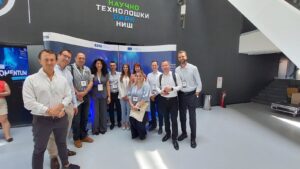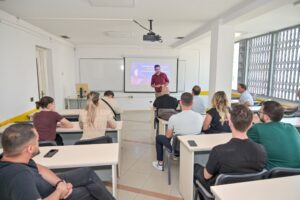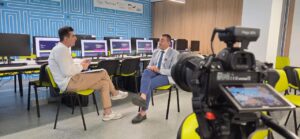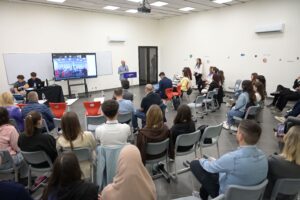University Metropolitan Tirana continues to demonstrate its commitment to bringing international experiences and the latest technologies closer to its students and academic staff. Recently, it hosted an open lecture titled: “Generative Artificial Intelligence and the use of ChatGPT in STEM Education at University Level,” delivered by PhD Umberto Delloiacono, lecturer and researcher in the field of Artificial Intelligence at the University of Campania, Italy.
The lecture focused on the growing impact of Generative Artificial Intelligence (GAI), with particular emphasis on its application in STEM fields – Science, Technology, Engineering, and Mathematics. Attending the event were students, professors, and technology professionals who had the opportunity to explore the transformative potential of these tools in the context of higher education.
During his presentation, Prof. Delloiacono emphasized: “Artificial Intelligence is no longer a distant or abstract concept; it is now part of our academic and professional daily lives. Tools like ChatGPT are not replacing teachers – on the contrary, they are empowering their role in creating a richer, more interactive, and personalized learning environment.”
He demonstrated several practical use cases of ChatGPT in teaching, including assistance in essay writing, the creation of personalized math problems, data analysis, and simulations for scientific experiments.
One of the most thought-provoking topics discussed was the role of AI in developing critical thinking. Prof. Delloiacono pointed out: “When we use AI in the classroom, we shouldn’t focus solely on the answers it gives us, but also on the questions it encourages us to ask. That’s how we cultivate critical thinking and analytical engagement among students.”
As the lecture progressed, the discussion took an important turn toward the ethical challenges posed by the use of AI in higher education. Professor Delloiacono raised several deep and provocative questions, inviting participants to reflect not only on the benefits but also on the responsibilities that come with these technologies.
One of the most sensitive issues addressed was the preservation of academic integrity. He noted that using AI to generate essays, solve problems, or create research content could undermine students’ intellectual honesty if not accompanied by clear guidelines and ethical education.
The phenomenon of automated plagiarism was also discussed, where students might unknowingly copy AI-generated material, often unaware of the boundaries between their own creativity and machine-generated content.
Another concern was the risk of over-reliance on technology, particularly when AI is used not as an aid but as a substitute for independent thinking. The professor cited examples where students had turned to AI for every question or task, gradually diminishing their ability to analyze, research, and think critically.
In this context, he stressed the need for a critical education about AI – one that goes beyond the technical use of tools and includes a deeper understanding of their social, ethical, and professional impact.
“It’s not enough to know how ChatGPT works; you have to know when to use it, why to use it, and what consequences its use might have,” he concluded, wrapping up the most reflective part of the lecture.
UMT students and professors engaged in an interactive session of questions and reflections. Some expressed particular interest in applying AI in their research projects and in developing educational platforms supported by artificial intelligence algorithms.
The event was highly appreciated by attendees, bringing forward new ideas and a modern approach to the development of higher education.
At the end of the lecture, the importance of integrating AI into university curricula and the digital skills development of both faculty and students was highlighted as a necessary step for achieving future academic and professional success.




